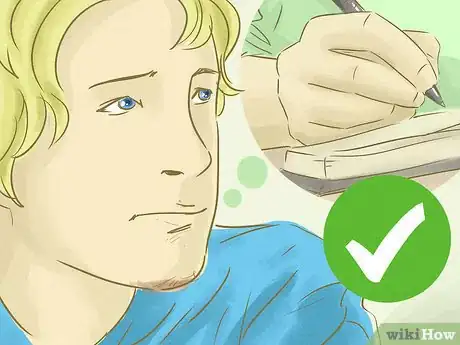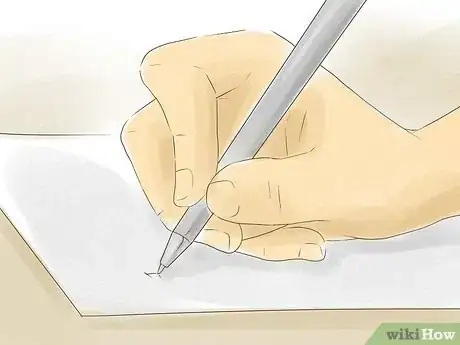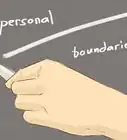This article was co-authored by Lauren Urban, LCSW. Lauren Urban is a licensed psychotherapist in Brooklyn, New York, with over 13 years of therapy experience working with children, families, couples, and individuals. She received her Masters in Social Work from Hunter College in 2006, and specializes in working with the LGBTQIA community and with clients in recovery or considering recovery for drug and alcohol use.
There are 12 references cited in this article, which can be found at the bottom of the page.
wikiHow marks an article as reader-approved once it receives enough positive feedback. In this case, 100% of readers who voted found the article helpful, earning it our reader-approved status.
This article has been viewed 35,710 times.
Going through an ordeal that is emotionally or psychologically traumatic can have lasting effects. Oftentimes, we assume that if we do not have physical scars, we should be okay to move on. Emotional pain, however, can sometimes take much longer to find healing. This type of pain requires acknowledgment and acceptance to start the healing process. Only then can you move on and use your experience for positive future growth. Learn how to overcome emotional pain and move forward with your life.
Steps
Acknowledging Your Emotions
-
1Reflect on the situation. Acknowledging the pain you feel is the first step towards healing. Maybe you just went through a devastating breakup. You can't refuse to look at it and just tuck it away, acting as if the hurt didn't happen. If you suppress the pain it will only make it worse.
- Write a summary about what happened to you and read it aloud.[1] Get some distance from what happened to you by placing it in front of you and trying to objectively describe it. Explain what happened in great detail and then read it aloud.
- For example, you might explain in detail what happened to incite the breakup and how you felt then and now.
- It can also be helpful to share your testimony with others when you're ready. You might tell a friend or loved one who is going through something similar or even participate in a support group pertaining to the issue you have faced.
-
2Tune into your feelings. Try to name the emotions you are experiencing. Listen to your mind and body and see what they are trying to tell you.[2]
- Perhaps your chest is tight and you feel hollow as if there is a piece missing from your body. Maybe you are thinking that you are afraid to be alone and you don't know how you will move forward. Acknowledge the physical and mental aspects of your emotions.
Advertisement -
3Practice self-compassion. Now that you have acknowledged and tuned into your feelings, it's time to validate what you're feeling by caring for yourself. Remember that it's okay to feel however you feel. Avoid beating yourself up or criticizing yourself for the way you feel. Say aloud what you're feeling and be okay with that. “I want to cry because I am hurt, but this, too, shall pass.”
- Other ways to show self-compassion may include giving yourself a hug, rubbing your shoulders as if you were comforting yourself, or treating yourself to something special that will cheer you up.
-
4Remain in control. Don't let your emotions run the show. Even if we do not enjoy experiencing negative emotions, it is a natural part of being human. Feeling hurt, disappointed, rejected, or betrayed is absolutely acceptable. What is not acceptable is to use those emotions as fuel to perseverate hurt and pain.[3]
- You might want to call your ex and beg to fix the relationship. Or, you may want to lash out in anger and betrayal. Gain control of your emotions so that you do not act out in a way you may regret later.
- Try deep breathing. Inhale through your nose for about 4 counts. Hold the breath for a few counts and then slowly exhale through your mouth. Repeat this until you start to feel more relaxed and in control.[4]
- Remind yourself of who you are and what you stand for. Make sure that your actions align with your own goals and are not impulsive responses to being hurt.
Finding Ways to Heal
-
1Express your emotions in healthy ways. Acknowledge and own the way you feel, and express those feelings in a healthy way. Exercise is a great way to blow off steam and work through your anger or heartache. You can also journal about your feelings or draw something to illustrate your emotions.[5]
-
2Treat yourself gently. When your body and mind are healthy, you are better equipped to deal with emotional trauma and stress. Make sure that you are getting adequate sleep (at least 7 to 9 hours per night), eating healthy, balanced meals, getting physical activity, avoiding self-medicating with alcohol and drugs, as well as doing things that soothe you and help you manage stress.[6]
- You can manage stress by performing relaxation techniques, practicing mindfulness, hanging out with fun and supportive friends, or exercising.
-
3Use your pain for good. Brainstorm a way you can use your unfortunate circumstance to improve your own life or the lives of others. There are tons of ways you can channel negative emotions into something positive.
- For example, you can use negative emotions to fuel creativity and problem-solving. When something bad has happened you are extremely motivated and equipped to think of solutions that can prevent the situation from happening again. You can also find ways to use the pain for good like sharing testimony to empower others or starting a nonprofit group to protect other survivors like yourself.[7]
- Let's say you lost a loved one in a preventable tragedy like a car accident. You can spread the word about the incident and educate others on how they can prevent such a thing from happening to them, like not texting and driving or not getting behind the wheel after drinking or when sleepy.
-
4Request physical touch from others. Touch is the most basic form of communication that humans have. When you are reeling from heartbreak or betrayal, it can be incredibly comforting to be touched. Science tells us that touch provides emotional balance and can even lead to better health.[8]
- Ask a friend for a hug. Simply grab your child or loved one's hand and squeeze it tight. Visit a spa for an invigorating massage. Touching another person can provide an untapped source for healing.
- If the emotional pain you have experienced was caused by touch, you may not yet be ready for this step. Use your judgment to determine if touch will heal or hurt depending on what you have gone through and how you are processing the pain.
-
5Find a support system.[9] During times of great emotional pain, you may have a desire to withdraw from others. Try to overcome this instinct and instead move into a circle of supportive, positive people who can help you heal.[10]
- A support system can be a natural one such as your family, a group of friends, or others who may have experienced a similar loss in their lives.
- It can feel awkward reaching out for help. Choose someone who is usually supportive and positive. Approach the person by sharing a little about what you're going through and then asking for advice: "I've been having a tough time coping with Jessica's death. How do you cope after a loss?"
- You can also reach out to online support forums. There are also inexpensive therapists on websites like TalkSpace.[11]
-
6Do activities that you enjoy. When you're reeling after an upsetting event it's best to treat yourself gently. Soothe yourself through this difficult time by leaning into the activities that make you smile.[12]
- These can be virtually anything--listening to music and dancing, riding your bike, chatting with a long-distance friend, or binge-watching your favorite TV show.
- Don't feel guilty about treating yourself. It can help lift your mood and remind you that there are good things in your life despite the bad.
-
7See a therapist. If your emotional pain is preventing you from being able to function in your everyday life, you may need to speak with a professional. A therapist can help you process your emotions and learn to cope with them in a safe and effective way. Search for a therapist in your local area, if you are having trouble finding healing on your own.[13]
- Signs that you need to get professional help may also include using alcohol and drugs to self-medicate, avoiding people, places or things that remind you of what happened, withdrawing from close friends and family, or having flashbacks of the upsetting event.
Moving Forward
-
1Avoid rumination. Rumination is the act of thinking about the upsetting event or situation over and over again. Maybe you were fired from your job and you now feel like a failure. You might constantly tell yourself “what if” and beat yourself up for not predicting it would happen. Rumination is poisonous to a healthy frame of mind and can ultimately lead to depression.
- Stop rumination by looking at the situation as a learning experience. Ask yourself what lesson you learned from losing your job, and use that as fuel to inspire future actions.
- You can also overcome a rumination habit by scheduling a daily worry period. This is a period of about 15 to 30 minutes where you are allowed to think about your worries each day. Any other worrying done outside this time period must be postponed. Empower your worry periods even more by making strategic problem-solving plans about the things you find yourself worrying about. Maybe you can write out a plan to update your resume and start job-hunting.
-
2Release feelings of guilt. When you feel guilty about something, you become the architect of your own unhappiness. Guilt keeps you from moving forward in your life because there is unresolved shame or pain that needs to be addressed.
- To move on from guilt, you must apologize—to yourself or another person—for the role you played in an upsetting situation. You must forgive yourself and give yourself permission to reengage with your life and stop standing in the past.[14]
-
3Look for the silver lining. Failing in an important aspect of life can result in a great emotional hit. When you face disappointment or failure, it's necessary to gain a different perspective so that you do not get bogged down and lose your focus.
- You can gain perspective by talking to others about your perceived failure. Friends and loved ones can help you to understand that failure in one area does not immediately result in failure in all areas or even a pattern of failure.[15]
- You can also reframe the failure as a lesson learned or one more obstacle you have surpassed that is pushing you that much closer to future success. You may have lost your job, but perhaps this happened to push you towards changing careers and doing something you really enjoy.
- Expressing gratitude can also help you feel better. Try to write down three things each day that you are grateful for, such as sunny weather, your best friend, or strong coffee in the morning.
-
4Boost your self-esteem.[16] Going through an intense emotional situation can cause one's self-esteem to plummet. Constantly running failures through your head, feeling rejected, being knocked down by failure—all of these circumstances have the power to take your self-confidence down a notch. Engage in activities that you are good at to feel a positive sense of accomplishment.[17]
- Bypass this hit to your self-esteem by showing compassion for yourself. Remind yourself that you are only human, not a superhero. These negative circumstances serve to make you stronger.
- It can also help to take an inventory of all the characteristics you have that serve as strengths. Recall these attributes when you feel poorly about yourself. In addition, be willing to accept compliments as well-intentioned rather than questioning their authenticity. Be proud of who you are despite past hurts and shortcomings.
-
5Focus on the positives.[18] It's incredibly easy to lose sight of the good things happening in your life when an important element is under fire. Try to maintain a balanced perspective. Nothing is all bad. No matter how long it rains, at some point, you can be sure the sun will shine again. Focus on the good and you may start to feel better about your situation.
- Make a list of things you are grateful for in your life. Maybe losing your job showed you how wonderful your support network is. Maybe the setback made you grateful you were always such a consistent saver because now you have a little money tucked away until you find a new opportunity. Look at the good in your life. You may be surprised to learn that you have a lot more going for you than you previously thought.
Expert Q&A
-
QuestionHow do I heal myself mentally?
 Lauren Urban, LCSWLauren Urban is a licensed psychotherapist in Brooklyn, New York, with over 13 years of therapy experience working with children, families, couples, and individuals. She received her Masters in Social Work from Hunter College in 2006, and specializes in working with the LGBTQIA community and with clients in recovery or considering recovery for drug and alcohol use.
Lauren Urban, LCSWLauren Urban is a licensed psychotherapist in Brooklyn, New York, with over 13 years of therapy experience working with children, families, couples, and individuals. She received her Masters in Social Work from Hunter College in 2006, and specializes in working with the LGBTQIA community and with clients in recovery or considering recovery for drug and alcohol use.
Licensed Psychotherapist Finding a way to relax and give yourself a break will give you the space you need to start healing. Just chill out for a while. Hang out with someone you enjoy, engage in an activity you care about, and do something fun. In many cases, healing mentally just comes down to taking time for yourself.
Finding a way to relax and give yourself a break will give you the space you need to start healing. Just chill out for a while. Hang out with someone you enjoy, engage in an activity you care about, and do something fun. In many cases, healing mentally just comes down to taking time for yourself. -
QuestionIs it ok to be unhappy?
 Lauren Urban, LCSWLauren Urban is a licensed psychotherapist in Brooklyn, New York, with over 13 years of therapy experience working with children, families, couples, and individuals. She received her Masters in Social Work from Hunter College in 2006, and specializes in working with the LGBTQIA community and with clients in recovery or considering recovery for drug and alcohol use.
Lauren Urban, LCSWLauren Urban is a licensed psychotherapist in Brooklyn, New York, with over 13 years of therapy experience working with children, families, couples, and individuals. She received her Masters in Social Work from Hunter College in 2006, and specializes in working with the LGBTQIA community and with clients in recovery or considering recovery for drug and alcohol use.
Licensed Psychotherapist Yes, it's normal to be unhappy sometimes. Don't give yourself a hard time about it. Just acknowledge that you feel this way and let the moment pass.
Yes, it's normal to be unhappy sometimes. Don't give yourself a hard time about it. Just acknowledge that you feel this way and let the moment pass. -
QuestionHow can I feel better fast?
 Lauren Urban, LCSWLauren Urban is a licensed psychotherapist in Brooklyn, New York, with over 13 years of therapy experience working with children, families, couples, and individuals. She received her Masters in Social Work from Hunter College in 2006, and specializes in working with the LGBTQIA community and with clients in recovery or considering recovery for drug and alcohol use.
Lauren Urban, LCSWLauren Urban is a licensed psychotherapist in Brooklyn, New York, with over 13 years of therapy experience working with children, families, couples, and individuals. She received her Masters in Social Work from Hunter College in 2006, and specializes in working with the LGBTQIA community and with clients in recovery or considering recovery for drug and alcohol use.
Licensed Psychotherapist Do an activity that you're good at! This will give you a boost of self-confidence, which will help you feel better.
Do an activity that you're good at! This will give you a boost of self-confidence, which will help you feel better.
References
- ↑ http://dbtselfhelp.com/html/letting_go.html
- ↑ Lauren Urban, LCSW. Licensed Psychotherapist. Expert Interview. 3 September 2018.
- ↑ Lauren Urban, LCSW. Licensed Psychotherapist. Expert Interview. 3 September 2018.
- ↑ https://www.psychologytoday.com/blog/fulfillment-any-age/201502/5-ways-get-your-unwanted-emotions-under-control
- ↑ https://www.takingcharge.csh.umn.edu/activities/expressing-emotions-exercise
- ↑ http://www.helpguide.org/articles/ptsd-trauma/emotional-and-psychological-trauma.htm
- ↑ http://www.huffingtonpost.com/2013/10/29/how-to-turn-negative-emot_n_4158113.html
- ↑ http://greatergood.berkeley.edu/article/item/hands_on_research
- ↑ http://www.mayoclinic.org/healthy-lifestyle/stress-management/in-depth/social-support/art-20044445
- ↑ Lauren Urban, LCSW. Licensed Psychotherapist. Expert Interview. 3 September 2018.
- ↑ http://www.apa.org/helpcenter/online-therapy.aspx
- ↑ https://www.nia.nih.gov/health/publication/participating-activities-you-enjoy
- ↑ Lauren Urban, LCSW. Licensed Psychotherapist. Expert Interview. 3 September 2018.
- ↑ https://www.psychologytoday.com/blog/fulfillment-any-age/201310/7-practical-strategies-overcome-emotional-pain
- ↑ https://www.psychologytoday.com/blog/fulfillment-any-age/201310/7-practical-strategies-overcome-emotional-pain
- ↑ https://www.psychologytoday.com/blog/fulfillment-any-age/201310/7-practical-strategies-overcome-emotional-pain
- ↑ Lauren Urban, LCSW. Licensed Psychotherapist. Expert Interview. 3 September 2018.
- ↑ http://www.oprah.com/spirit/how-to-be-optimistic-focus-on-the-positive














































































